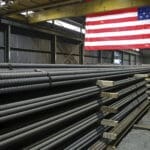Supply Chain & Logistics News (September 9th- 13th 2024)
On Tuesday, the two presidential nominees for the 2024 United States presidential race faced off in a 90-minute debate. Among various topics, the candidates discussed trade, clean energy, and tariffs. Within the first 10 minutes of the debate, Trump responded to Harris’s announcement about raising tariffs by stating, “Other countries are finally going to pay us after 75 years for all that we’ve done for the world.” The Biden administration has largely maintained existing tariffs while increasing others and investing heavily in U.S. semiconductor manufacturing. Harris later claimed that the U.S. has added 800,000 manufacturing jobs since taking office, including those related to COVID-19 economic recovery. However, the Bureau of Labor estimates that the actual number is 739,000 manufacturing jobs created since Biden assumed office in January 2021. These jobs are partly due to the Inflation Reduction Act, which Goldman Sachs estimates could attract up to $3 trillion in private investment over the next decade. Both candidates emphasized the importance of domestic auto manufacturing, with Trump committing to impose tariffs on Chinese cars to ensure they are not imported into the U.S. Under the Biden-Harris administration, Chinese EVs currently face a 27.5% tariff.
Now let’s get into the Supply Chain News for the week:
International Supply Chain Resilience Pact has been Formed
On September 9, 2024, the United Kingdom, United States, and Australia signed a Memorandum of Understanding (MoU) to enhance strategic cooperation and address risks in critical supply chains. A new Supply Chain Resilience Cooperation Group will be formed to share data and coordinate efforts in identifying and addressing threats and disruptions, starting with a pilot focused on the telecommunications supply chain. This collaboration aims to strengthen supply chain resilience, a critical factor for economic stability and further solidifies the long-standing partnership between the three nations.
The U.S. Department of Transportation’s Federal Highway Administration (FHWA), along with the Joint Office of Energy and Transportation, has issued a Request for Information (RFI) from stakeholders to support the development of electric vehicle (EV) charging infrastructure for medium- and heavy-duty vehicles. This effort aligns with the Biden-Harris Administration’s goals to build a Made-in-America EV charging network and decarbonize freight transportation through zero-emission vehicles. The RFI seeks input on EV charger needs, vehicle charging patterns, technology standardization, and workforce/supply chain requirements for vehicles like delivery vans, school buses, and semi-trucks. The goal is to achieve 30% zero-emission vehicle sales by 2030 and 100% by 2040, driven by lower battery costs, environmental benefits, and corporate sustainability goals.
Climate-Driven Impacts on Avocados Decreased Harvests but Increased Profits
Drought and high temperatures tied to El Niño constrained avocado supply from Mexico and Peru, prompting U.S. distributors to rely more on California’s unexpectedly strong harvest, which saw volumes 40% higher than projected. While California increased its avocado supply by over 50%, it couldn’t fully offset reduced exports from Mexico, the source of 80% of U.S. avocados. Supply shortages pushed prices up, though demand remained strong, with consumption tripling since 2001. Limoneira plans to expand production by 1,000 acres to meet demand, while supply from Peru is expected to recover after El Niño. However, strong consumer appetite may keep prices high despite future supply improvements.
A new Ocean Carrier Alliance is formed, “Premier Alliance”
Ocean Network Express (ONE), HMM, and Yang Ming Marine Transportation are forming a new alliance called the Premier Alliance, as announced in a press release. This alliance will cover major trade lanes connecting Asia to the North American West and East Coasts, the Mediterranean, North Europe, and the Middle East. Jeremy Nixon, CEO of ONE, stated that the new alliance will provide strong, reliable, and dependable direct port container services for customers across Transpacific and Asia-Europe trade routes. MSC is set to have a slot exchange with Premier Alliance that will involve nine services with expected frequent sailings in Asia to North Europe and Mediterranean trade lanes.
Key Trading Ports along Gulf Coast are being Assessed for Damage After Francine Lashed Lousiana
Ports along the Gulf Coast are assessing damage from Hurricane Francine, which made landfall in Louisiana as a Category 2 hurricane and has since been downgraded to a tropical depression. The storm, now with wind speeds of 35 mph, caused significant disruption, including a storm surge warning for parts of Louisiana and Mississippi. Port Fourchon, crucial for oil supplies, is in recovery mode after mandatory evacuations, while the Port of New Orleans is closed for damage assessment. Ports in Greater Baton Rouge and Plaquemines are also closed, but Port Galveston in Texas is operating with restrictions. President Biden approved a disaster declaration for Louisiana, and disaster relief organizations, including the American Logistics Aid Network, are coordinating efforts. Power outages and local curfews are affecting hundreds of thousands of customers.
Song of the Week:
The post Supply Chain & Logistic News (September 9th- 13th) appeared first on Logistics Viewpoints.
